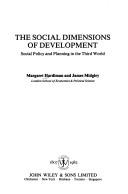| Listing 1 - 10 of 19 | << page >> |
Sort by
|

ISBN: 0415042097 Year: 1992 Publisher: London New York Routledge
Abstract | Keywords | Export | Availability | Bookmark
 Loading...
Loading...Choose an application
- Reference Manager
- EndNote
- RefWorks (Direct export to RefWorks)
Book
ISBN: 9781210877 Year: 1980 Publisher: Ibadan, Nigeria Ibadan University Pub. House
Abstract | Keywords | Export | Availability | Bookmark
 Loading...
Loading...Choose an application
- Reference Manager
- EndNote
- RefWorks (Direct export to RefWorks)
Book
ISBN: 0080303420 9780080303420 Year: 1983 Volume: 116 Publisher: Oxford: Pergamon,
Abstract | Keywords | Export | Availability | Bookmark
 Loading...
Loading...Choose an application
- Reference Manager
- EndNote
- RefWorks (Direct export to RefWorks)
Book
ISBN: 902372805X 9789023728054 Year: 1974 Volume: 5 Publisher: Rotterdam : Rotterdam university press,
Abstract | Keywords | Export | Availability | Bookmark
 Loading...
Loading...Choose an application
- Reference Manager
- EndNote
- RefWorks (Direct export to RefWorks)
Teaching --- Developing countries --- Educational planning --- Education --- Mathematical models --- 37 --- #SBIB:316.334.1O350 --- Opvoeding en onderwijs --(algemeen) --- Onderwijs en economie --- 37 Opvoeding en onderwijs --(algemeen) --- 37 Education --- Educational planning - Developing countries - Mathematical models --- Education - Developing countries - Mathematical models

ISBN: 0471101931 0471101842 9780471101932 Year: 1982 Publisher: CHICHESTER: Wiley,
Abstract | Keywords | Export | Availability | Bookmark
 Loading...
Loading...Choose an application
- Reference Manager
- EndNote
- RefWorks (Direct export to RefWorks)
Rural development --- Poor --- Urbanization --- Education --- Housing policy --- Social service, Rural --- Developing countries --- Social policy --- Economic geography --- Poor - Developing countries --- Urbanization - Developing countries --- Education - Developing countries --- Housing policy - Developing countries --- Developing countries - Social policy

ISBN: 0044450192 Year: 1989 Publisher: London Boston Unwin Hyman
Abstract | Keywords | Export | Availability | Bookmark
 Loading...
Loading...Choose an application
- Reference Manager
- EndNote
- RefWorks (Direct export to RefWorks)
Archaeology --- Study and teaching --- Educational anthropology --- Minorities --- Education --- Developing countries --- Race awareness --- History --- Archaeology - Study and teaching. --- Educational anthropology. --- Minorities - Education. --- Education - Developing countries. --- Race awareness - Study and teaching. --- Developing countries - History - Study and teaching. --- Study and teaching. --- Education.
Book
ISBN: 0821333119 9780821333112 Year: 1995 Publisher: Washington: Banque mondiale,
Abstract | Keywords | Export | Availability | Bookmark
 Loading...
Loading...Choose an application
- Reference Manager
- EndNote
- RefWorks (Direct export to RefWorks)
338.340 --- 351.3 --- Algemene ontwikkeling in de Derde Wereld. --- Openbaar bestuur: onderwijs. --- Objectives of teaching --- Developing countries --- Education --- Education and state --- Educational equalization --- Economic development --- Finance --- Effect of education on --- Pedagogiek en onderwijskunde --- Effect of education on. --- Finance. --- didactiek naar onderwijsniveau en leerlingkenmerken. --- Algemene ontwikkeling in de Derde Wereld --- Openbaar bestuur: onderwijs --- Education - Developing countries --- Education - Developing countries - Finance --- Education and state - Developing countries --- Educational equalization - Developing countries --- Economic development - Effect of education on
Book
ISBN: 0080358586 1483297667 Year: 1988 Volume: vol 5 Publisher: Oxford Tokyo New York Pergamon Press
Abstract | Keywords | Export | Availability | Bookmark
 Loading...
Loading...Choose an application
- Reference Manager
- EndNote
- RefWorks (Direct export to RefWorks)
Education --- -Children --- Education, Primitive --- Education of children --- Human resource development --- Instruction --- Pedagogy --- Schooling --- Students --- Youth --- Civilization --- Learning and scholarship --- Mental discipline --- Schools --- Teaching --- Training --- Finance --- -Case studies --- -Finance --- Developing countries --- Case studies --- Education - Developing countries - Finance - Case studies. --- Children --- Finance&delete&
Book
ISBN: 9400798660 9400718500 9400718519 Year: 2011 Publisher: Dordrecht : Springer,
Abstract | Keywords | Export | Availability | Bookmark
 Loading...
Loading...Choose an application
- Reference Manager
- EndNote
- RefWorks (Direct export to RefWorks)
This highly controversial book challenges half a century of conventional educational wisdom. The Progressive Education Fallacy in Developing Countries: In Favour of Formalism argues that progressive teacher education and curriculum reforms in developing countries are wrong in principle and widespread failures in practice. The book is essential reading for academics, aid and educational professionals, and for overseas students of education. In a methodologically elegant contribution to the theory, methodology and practice of education in developing countries, 12 chapters address the merits of formalism and the risks associated with what Gerard Guthrie identifies as the Progressive Education Fallacy. The Fallacy, that developing the enquiring mind needs enquiry teaching methods in schools, has lead to many inappropriate attempts at educational transfer. Progressive assumptions about the classroom have rarely been debated or tested experimentally in non-Western, especially non-Anglophone, cultures. School effectiveness research too has failed to examine adequately classroom processes and their cultural contexts. A formal analysis of ideas inherent in the Fallacy uses C.E. Beeby’s stages model as an influential example of the progressive position. Progressive claims are refuted using the case of failed curriculum reforms in Papua New Guinea and an analysis of the unlikelihood of the adoption of progressive teaching in Confucian-tradition China. Widespread evidence from Africa and Asia also shows that progressive education reforms have failed in countries with pedagogic paradigms founded in revelatory epistemologies. Old-fashioned though formalism may be in some Western countries, classroom change in the developing world does not necessarily require progressive methods, but can focus on upgrading formalism. "Gerard Guthrie makes a significant , if challenging and controversial, contribution to the international literature on education and development" Michael Crossley, University of Bristol, UK.
Education -- Developing countries. --- Education. --- Teaching -- Developing countries. --- Teaching. --- Teaching --- Education --- Social Sciences --- Theory & Practice of Education --- Comparative education. --- Education, Comparative --- International education. --- International and Comparative Education. --- History --- Global education --- Intellectual cooperation --- Internationalism --- Children --- Education, Primitive --- Education of children --- Human resource development --- Instruction --- Pedagogy --- Schooling --- Students --- Youth --- Civilization --- Learning and scholarship --- Mental discipline --- Schools --- Training --- International education .
Book
ISBN: 0821385267 9786612906237 0821385283 1282906232 9781282906235 9780821385289 Year: 2010 Publisher: Washington, DC : World Bank,
Abstract | Keywords | Export | Availability | Bookmark
 Loading...
Loading...Choose an application
- Reference Manager
- EndNote
- RefWorks (Direct export to RefWorks)
The World Bank created this Early Child Development (ECD) Guide in response to a growing demand from Task Team Leaders (TTLs) for advice and support to facilitate the policy dialogue on the topic of ECD and to help policy makers make and implement relevant choices on how to best invest in ECD in the context of their country's economy and national priorities. This Guide fills a gap in the literature by (i) distilling existing information in a user-friendly format, (ii) providing practical information on topics that have recently become particularly relevant in ECD (e.g., measuring child develop
Child development -- Developing countries. --- Child welfare -- Developing countries. --- Early childhood education -- Developing countries. --- Child development --- Child welfare --- Early childhood education --- Social Welfare & Social Work --- Social Sciences --- Child & Youth Development --- Child study --- Children --- Development, Child --- Development --- Education --- Developmental biology --- Developmental psychobiology --- Child rearing
| Listing 1 - 10 of 19 | << page >> |
Sort by
|

 Search
Search Feedback
Feedback About UniCat
About UniCat  Help
Help News
News